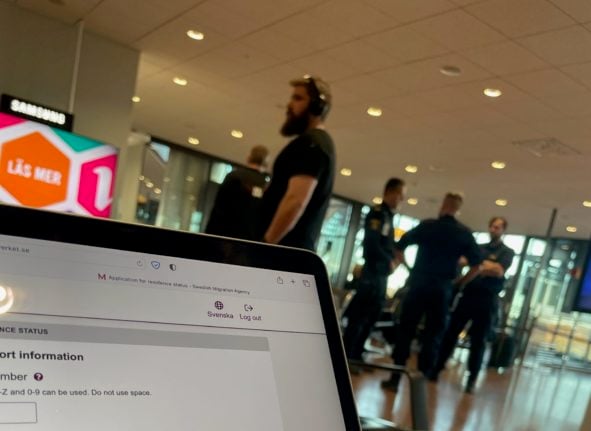Philpott, who was born in Northern Ireland, has spent 12 years living in Sweden and is so well-integrated that he had not really kept up with the implications of the UK leaving the European Union.
“I’m kind of out of the loop. I’m not really a member of the whole community thing,” he tells The Local. “I don’t really hang around with British people or anything. My friends are all Swedish. And also I’m a chef, so I work weird hours.”
He also hadn’t travelled outside Sweden since before the Covid-19 pandemic
This means that when last month he decided to visit his mother in Scotland so they could celebrate their joint birthdays — her 60th and his 40th — he just booked a ticket and flew to meet her.
It was only on his return to Stockholm’s Arlanda airport that his troubles began.
“The girl on the passport desk said, ‘where’s your passport? What’s your reason for coming here?’ And I said, ‘I live here’. And she said, ‘You’re not allowed into Sweden. I’m sorry.’ You no longer have your permanent residence’.”
He was then met by a group of border police, who he showed his rental contracts, his job contract, and told about his two Swedish children, aged 11 and 9.
“And they’re like, yes, but I think you still have to leave,” Philpott recalls, saying he was then told that he would either have to sleep at the airport for three days until the flight to Scotland the Swedish authorities could book, or he could pay for his own flight.
He paid for his flight, and was then marched right up to the plane by four Swedish police officers.
“I was led onto the plane by four cops and then given my passport at the plane,” he says. “It was kind of humiliating actually. Like I’m a bloody drug dealer.”
READ ALSO:
Despite the efforts of the British embassy and news sources such as The Local to inform Brits living in Sweden about the changes Brexit would bring to their legal status, Philpott had entirely missed the fact that his “permanent residence” in Sweden, despite the name, had ceased to be valid. As he hadn’t travelled outside Sweden since before the Covid-19 pandemic began, he had never realised that there was an issue.
When he asked a question on the Reddit discussion site about his situation, some readers were helpful, but others were highly critical of him for making the mistake. He soon learned that he should have applied for post-Brexit residence before the deadline of December 31st last year.
“I mean, I just screwed up. I just didn’t know,” he tells The Local.
On his return to Scotland, he quickly informed the restaurant chain where he was now employed of the problems he was facing, and began desperately calling the Swedish Migration Agency to work out what he needed to do.
The British Embassy in Stockholm said they were not able to help him. “They said it was out of their jurisdiction. They can’t do anything with migration,” he said.
After long waits to get through to officials, and several contradictory pieces of information from the agency, he finally got through to an official who seemed to know what he should do. He put in a late application for post-Brexit residence status, which she said would give him the right to return to Sweden while the application was being decided.
The only issue was that the letter confirming his application would be sent to his own flat in Solna, Stockholm, which meant his Swedish ex and their 11-year-old son had to collect it and post it to Stockholm.
“They sent it recorded post and with the fastest post possible, because I was worried about needing to get back to work, but it never updated on the tracking post on the Royal Mail app. I don’t know what happened with it, were they on strike or something?”
Eventually, after ten more day’s wait, he managed to get hold of the letter, and flew back to Stockholm, where he is now living and working while he waits for the Migration Agency’s decision.
“The actual worst thing about it is that they didn’t even ask me for the letter. I just walked straight through and I was like, bloody hell, you know. But my job has been super cool with me and yeah, it’s fine.”
“I don’t know actually what happens next. I’m going to try and book an appointment with the Migration Agency to see.”




 Please whitelist us to continue reading.
Please whitelist us to continue reading.
He is entitled to be a Swedish citizen if he has spent more than 5 years here. Why isn’t he applying for the citizenship? There is no too much to loose🙂